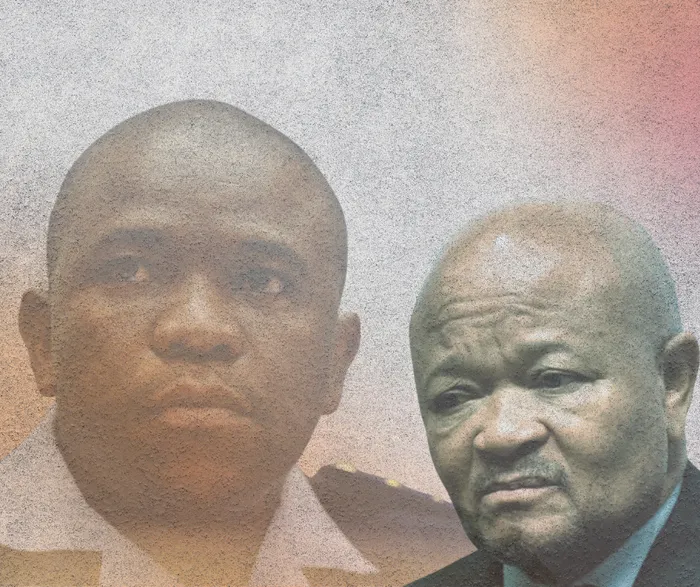'Much worse is coming’: Experts reveal alleged political interference in SAPS | Madlanga Commission

KZN’s top cop, Lt-Gen Nhlanhla Mkhwanazi, speaks at the Madlanga Commission, where he linked suspended Minister Senzo Mchunu to efforts to shut down a key task team.
Image: IOL Graphics
Much worse is expected to come out of the Madlanga Commission, as KZN police commissioner Nhlanhla Mkhwanazi is expected to name the key figures involved in alleged political interference within the SAPS, says security strategist Andy Mashaile.
Mashaile said Mkhwanazi is likely to name key figures involved in alleged political interference within the South African Police Service (SAPS), including judges, magistrates, prosecutors, senior police officers, and municipal police officials.
The commission, chaired by Justice Mbuyiseli Madlanga, started on Wednesday with Mkhwanazi as its first witness.
He has cast doubt on the motives behind the disbandment of the elite Political Killings Task Team (PKTT), suggesting the move was politically motivated and aimed at protecting powerful individuals.
The top cop alleged that suspended Police Minister Senzo Mchunu is "fully involved in the syndicate" behind numerous crimes, accusing him of sabotaging efforts to address political killings in the province.
He told the commission that he had made several attempts to engage with Mchunu over the task team's disbandment but his efforts were consistently ignored.
“For the minister referring to Mchunu) to isolate the PKTT raises questions,” said Mkhwanazi.
“The value of the police is to investigate crime... Whether he wasn't privy to the success of the team. These are questions I wanted to ask but never had the opportunity to.”
He alleged that someone must have advised Mchunu to disband the task team and suggested this action was never properly communicated to the National Commissioner General Fannie Masemola.
“In his own words, I think it will be on the record of Parliament, where the minister said he had an engagement with the president (Cyril Ramaphosa) about this decision, and that’s why he stands by it. Which is strange because the national commissioner did not receive anything to counter that.”
Mkhwanazi further claimed that Mchunu unilaterally ordered the disbandment and redirected 121 active dockets to the office of suspended Deputy National Commissioner Lt-Gen Shadrack Sibiya - where, according to Mkhwanazi, the cases were effectively “neutralised.”
Meanwhile, Mashaile said Mkhwanazi’s testimony could reveal some of the darkest truths about systemic corruption and interference within SAPS.
“A lot more worse is going to come out over these four days of testimony,” said Mashaile.
“He is going to reveal names of judges, magistrates, prosecutors, police officers, and politicians. I suspect some of these politicians are sitting on the Inter-Ministerial Committee.”
Mashaile warned that the public release of these names could undermine public confidence in parliamentary oversight structures, including the ad hoc committee investigating Mkhwanazi’s allegations.
“When those implicated are found to be sitting on oversight bodies, the public will lose confidence in these processes,” he said.
He added that political interference in the SAPS has long been a problem, involving not only Mchunu but also previous ministers.
“Political interference has been ongoing for years. Ministers have used the police to settle scores and even interact with, and benefit from, criminal syndicates. Some have even spent time in the luxury estates of known criminals. That is a huge problem.”
“This kind of interference compromises the operational independence and efficiency of the SAPS,” Mashaile said.
The commission continues on Thursday with Mkhwanazi returning to the stand, this time with documents that could directly implicate Mchunu.
These include internal memos, WhatsApp conversations, call logs, and official directives.
The commission is expected to examine how the PKTT was abruptly shut down in December 2024, despite being on the verge of making major arrests in politically sensitive cases.
Central to Thursday’s proceedings will be whether Mchunu’s actions violated the SAPS Act and undermined the constitutional requirement for policing independence.
The chairperson of the commission Justice Madlanga is also expected to question whether Masemola was consulted or deliberately bypassed, when the PKTT was dismantled and its cases transferred to Pretoria.
Particular attention will be paid to the role of Sibiya, in whose office the 121 dockets were allegedly buried without follow-up.
Mkhwanazi described the move as “political sabotage of law enforcement.”
Additionally, the commission is expected to probe alleged links between Mchunu and political associates Vuzimusi “Cat” Matlala and Brown Mogotsi, who Mkhwanazi claims conveyed instructions affecting SAPS appointments and deployments.
simon.majadibodu@iol.co.za
IOL